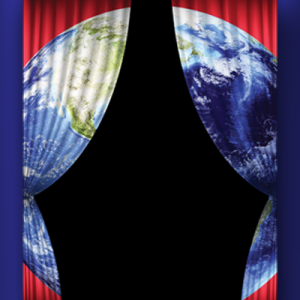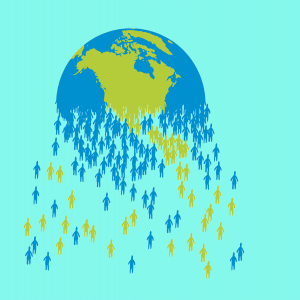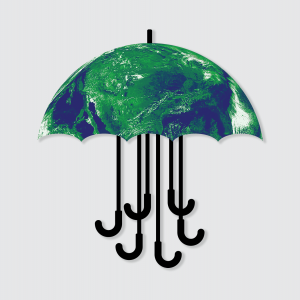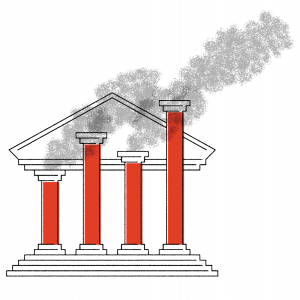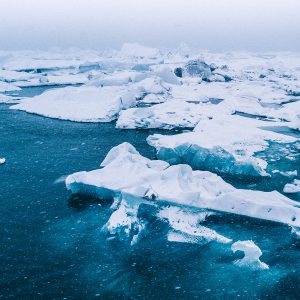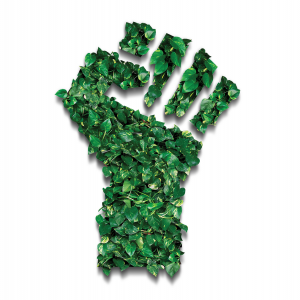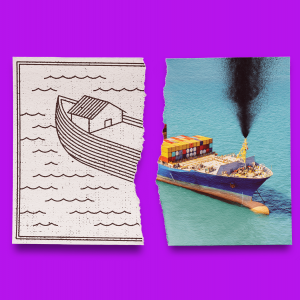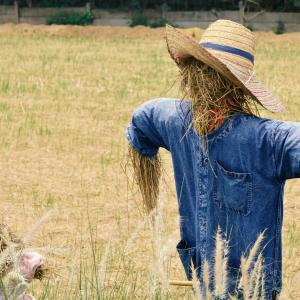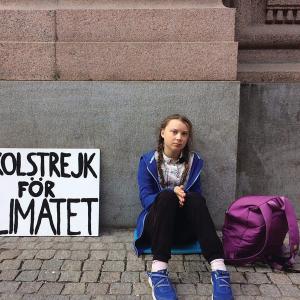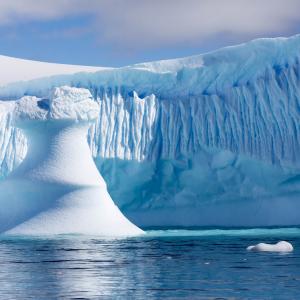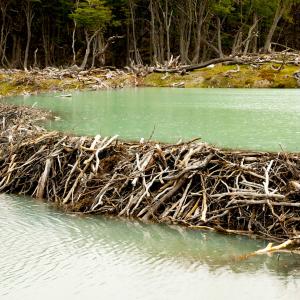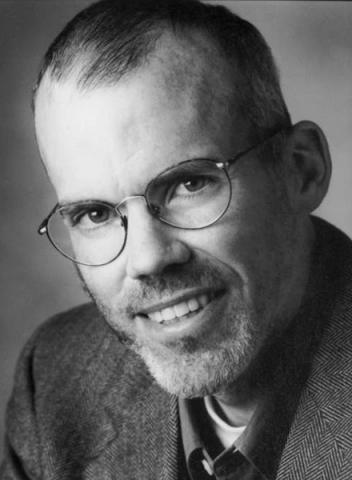
Bill McKibben, co-founder of 350.org, is the author most recently of The Flag, the Cross, and the Station Wagon: A Graying American Looks Back at his Suburban Boyhood and Wonders What the Hell Happened. He is the Schumann Distinguished Scholar at Middlebury College in Vermont and one of the Sojourners contributing editors.
Posts By This Author
Boomers, This is Your Moment
Our generation has fallen short on climate action, but there's still time to change our legacy.
WHO SHOULD CARE about the future? Young people, obviously, because they have to live in it. And they have done their job. I spent the ’80s and the ’90s and much of the ’00s listening to my peers complain about “kids today” and how they were apathetic and how it wasn’t like the ’60s and on and on. I don’t know if it was ever true, but it clearly hasn’t been in recent years: On issues from civil rights to prison reform to the one I know best—climate change—young people have been firmly in the forefront.
When I founded 350.org, the first iteration of a global climate movement, it was alongside seven college students—and it was their generation that built that movement out, from the divestment campaigners on college campuses to the Sunrise Movement that spurred the Green New Deal to Greta Thunberg and the many like her who built the powerhouse Fridays for Future coalition.
But they cannot do it alone. They need, in particular, their grandparents and great-grandparents—the boomers and the silent generation above them. Those of us in those categories are the fastest-growing demographic in the country—we add 10,000 to our ranks each day (though, of course, we subtract some too). We vote in huge numbers, and we have ended up with most of the assets, fairly or not.
Prayers Against a Pipeline
Learning from the wisdom of Anishinaabe elders in the fight against Line 3.
IT'S ALWAYS AN honor to be invited to help with someone’s good work—to be a guest in their house, especially when that house is as big as all outdoors.
Early in the summer, the Indigenous groups that had been leading the fight against the proposed Line 3 tar sands pipeline in northern Minnesota asked everyone to join them. Freed by the vaccine to travel, many of us took up the offer; it was my first journey since lockdown. And so we gathered on the banks of the Mississippi—so far up the great river that you could, in fact, hop from one bank to the other. There were two big protests on the same June morning; one, at a pumping station, ended in hundreds of arrests of brave activists and real aggression from the police, who buzzed demonstrators repeatedly in a helicopter that kicked up choking clouds of dirt. I was about 20 miles away, and our protest was much more peaceful—indeed, it was mostly spiritual.
Its leaders were a series of Native elders. Along a usually deserted county road, several thousand of us mustered to listen to a water and pipe ceremony led by a pair of Anishinaabe women; it was a hot day, and the drone of their voices against the beat of drums both lulled and emboldened. Soon, a few of us struck out across a marsh, past signs declaring that we were trespassing, aiming for a wooden road that the pipeline company had built across the swamp to carry its equipment. We gained it, and soon there was an occupation underway—tents going up, people making plans for sanitation and food supply and security. But mostly there was prayer and ceremony: Within hours a sacred fire had been lit, and five days of ceremony were underway.
Dismantling Creation and Spreading Disease
Attacks on science are dangerous.
TOO MUCH OF evangelicalism has, for too long, been hostile to too much of science—that’s a given, since opposition to evolution was in some ways the 20th-century coming-out party for a certain kind of fundamentalist Christianity. But that kind of militant ignorance didn’t do much practical damage; it was mostly an attack on the sheer beauty of the actual world God has created, one with its infinite, changing variety of life.
The 21st-century attacks on science are more dangerous, highlighted at the moment by the widespread refusal of white evangelicals to be vaccinated against the coronavirus. Despite valiant efforts by some evangelicals to fight back—Francis Collins at the National Institutes of Health being so often a good example—45 percent of white evangelicals said this spring that they didn’t plan to get the shot, compared with a quarter of the population at large.
One Irritating Thing About the Bible
It keeps instructing us to do things we don't want to.
THE IRRITATING THING about the Bible—well, one irritating thing about it—is that it keeps instructing us, in unambiguous terms, to do things we don’t want to.
On the first page it tells us to take care of the earth, which is quite embarrassing now that we’re fiddling with the thermostat and killing off large numbers of the creatures that we are supposed to look after.
Of course, it gets much worse once we reach the gospels and we’re told to take care of the poor and—well, I mean, come on, stop the steal. Nastiest of all is the quite specific demand to welcome the stranger. Clearly, we’re not into that—nearly three-quarters of white Christians voted for the candidate whose senior policy adviser, Stephen Miller, once said, “I would be happy if not a single refugee foot ever again touched American soil.”
These various unreasonable demands become even more unreasonable as time goes on, because they start to converge. Because we failed to take care of the earth, instead burning massive amounts of coal and gas and oil, we raised the temperature, and because hurricanes draw their power from the heat in the ocean, we now have more of them—this past season we set a record in the Atlantic, with a nonstop procession of storms that exhausted the regular alphabet and drove us deep into the Greek one. Hence, it was storms Eta and Iota that crashed into Central America in November, causing incredible wreckage: By some early estimates, Honduras saw damage equivalent to 40 percent of its GDP. (Katrina, one of America’s worst storms, cost us 1 percent of our GDP.) Not surprisingly, Honduras is now an even more difficult place to live—indeed, for many people an impossible one, given that food and shelter, which are actually necessary for survival, can’t be found.
We Have 9 Years Left—450 Sunday Sermons—to Save the Planet
Climate math turns to moral issues.
TRUMP IS BEHIND us now—four years of constant provocation and useless cruelty are over, which means ... we have about nine years left for the most important task any civilization has ever taken on. I want to lay out the basic math of our situation, because if we are at all serious about taking care of the earth God gave us (and we should be, since that was literally our first instruction), that math rules the day.
1) We are currently on a path to raise the temperature of the planet 3 degrees Celsius or more by century’s end. If we do that, we can’t have civilizations like the ones we’re used to—already, at barely more than 1 degree, wildfires and hurricanes have begun to strain our ability to respond.
2) In 2015, the world’s governments pledged in Paris to try and hold the rise in temperature to 1.5 degrees Celsius. The United States, shamefully, exited that agreement for a time, but now we’re back in.
3) To meet that target, scientists say we need to cut emissions in half by 2030 and then go on cutting until, by 2050, we’ve stopped burning fossil fuel altogether. But the crucial year is not 2050. It’s 2030—if we haven’t made huge cuts by then, we’ll miss the chance to stop short of utter catastrophe.
The Rich Shall Destroy the Earth
The rich don't just control the flow of carbon; they control the flow of power.
WHEN WE SAY that “humans are heating up the planet,” we are technically correct, and yet misleading. Humans are indubitably driving climate change—but only some of us.
An Oxfam study released this fall showed that between 1990 and 2015—a period when we poured more carbon into the atmosphere than in all of history before that time—the richest 1 percent of humanity accounted for more of that damage than the entire bottom 50 percent of the species. In case you think that the top 1 percent is Jeff Bezos and Bill Gates, remind yourself that in fact it’s anyone whose income tops $109,000 a year—that includes plenty of readers of this magazine. The richest 10 percent of humanity accounts for half of total emissions—that’s everyone whose income is above $38,000. That’s quite likely you; it’s certainly me.
These people are scattered around the world, though the biggest concentrations are in the U.S., the EU, China, and the Middle East; India is appearing in the league tables too, a reminder that inequality is as much a problem within nations as between them. But what’s really sad, of course, is that anyone with a decent income is able to insulate themselves from most of the problems they’re causing. It’s people in poverty—whether in the Lower Ninth Ward of New Orleans or along the delta of the Brahmaputra in Bangladesh—who get hit first and hardest.
Plagues of Our Lives
God's people are failing to meet the first instruction laid down in Genesis.
RIGHT THERE ON page one, it explains that our job is to exercise careful dominion over the planet, which God has just made and found good. It’s literally job one.
So let’s just list a few of the things that have happened over the last four years in this country to see how we’re doing. The administration has, according to The New York Times:
Dramatically weakened the fuel-economy standards for cars and trucks; canceled a requirement that oil and gas companies even report their methane emissions, at precisely the moment that methane emissions (a key greenhouse gas) are soaring; weakened federal rules to prevent air pollution in national parks; withdrawn from the Paris climate accords, the only global effort to slow climate change; shrunk national monuments to allow for more oil drilling; pushed through plans for pipelines despite massive resistance from farmers, ranchers, and Native Americans in their path; permitted the use of seismic air guns for oil and gas exploration in the Atlantic, despite the danger to marine life that had led to a ban; opened the Arctic National Wildlife Refuge (the largest wildlife refuge in the country) to oil and gas drilling; revoked Obama-era flood standards for new federal projects requiring that sea level rise be considered; reversed Obama-era rules on sport hunting so that it’s now legal to bait grizzly bears with grease-soaked doughnuts; revoked a rule preventing coal companies from dumping mining debris in streams; blocked plans to mandate more efficient light bulbs; stopped payments we’d promised to the Green Climate Fund, which is designed to help poor countries reduce carbon emissions; and restarted the sale of plastic bottles in national parks. Believe me, I could go on.
Pandemic Survival Is a Group Project
We can’t just return to some old normal.
ALMOST FROM THE first day of the COVID-19 crisis, the question in the back of many minds has been: How soon will this be over? When can we get back to normal?
For irresponsible people, the answer has been: Now. Schooled by a lifetime in a consumer society, deprivation of any kind seems impossible, hence the pictures of people demanding, sometimes at gunpoint, that the barber shop or sports bar be opened back up.
For more responsible souls, the answer has been: Once we have enough tests. Or once we have good treatments for the coronavirus. Or once we have a vaccine.
But the real answer, in some sense, may be never.
Because, of course, this pandemic is just one crisis buried within a much larger one: the reaction of the natural world to the demands placed on it by a species making unprecedented demands.
Pandemics Remind Us Biology Can Upend Our Lives
The courage of scientists, doctors, and nurses will have been wasted if nothing deeper changes in how we treat one another and the planet.
FOR CHRISTIANS, AND really for all humans, the particular horror of the coronavirus is that the best way to help is to separate from others. Unlike almost every other natural disaster, where our species’ instinct and our theological directive is to love our neighbors, our job in the pandemic is to separate ourselves. Don’t lay on hands: wash them. Don’t give a lingering, loving hug: stand at least six feet away making awkward gestures. The college where I work quickly sent its students home, so there’s not even the satisfaction of seeing them: Instead, we’re now engaged in something called “remote learning.”
If there is a grace here amid the very real suffering, it’s that we’re also being asked to go a little quiet—to reduce our busyness, to sequester ourselves in our homes. And for a society that’s been lately marked by an almost obsessive over-achievement, a society whose wealthiest members boast not of their leisure but of their workaholism, that’s full of interesting possibilities. Here are some of the things I’ve been reflecting on.
One, the physical world is very real. We spend our days staring into screens, so it’s easy to forget that we live on a planet where biology—in the form of a tiny microbe—can upend every facet of life. I know this to be true because I spend my life working on climate change, the much larger crisis that grips our planet. But day to day even I tend to forget just how real physics and chemistry—the driving forces of global warming—really are. In a created world, physical reality is the bottom line. It can’t be spun—in fact, the absurd efforts of President Trump to do just that seem finally to have revealed his imperial lack of clothing to many more Americans.
Maybe Hell on Earth Looks Like the Australian Wildfires
God didn’t tell us we’d be consigned to the flames—but neither did God tell us we couldn’t consign ourselves.
LET'S TALK ABOUT HELL. In David Bentley Hart’s remarkably important book That All Shall Be Saved, he outlines the reasons that we should not fear an afterlife of unending torment in a Dantesque lake of flame. “It makes no more sense, then, to say that God allows creatures to damn themselves out of his love for them or out of his respect for their freedom than to say a father might reasonably allow his deranged child to thrust her face into a fire out of a tender regard for her moral autonomy.” Read the book—really, read it. It will inoculate you against some of the ideas about God that can’t help but edge their way into your psyche.
But then let’s talk about the other kind of hell, the one we make for ourselves. And here I’m going to skip the usual discussions about the various “hells” we might build by our greed, our narcissism, our selfishness—the hells of addiction, loneliness. They’re very real, very sad, and very overwhelming, as are the Hades of poverty and of racial oppression.
For now, though, I want to talk about the hell that looks like hell. In Australia, in the first days of the new year, bushfires were creating walls of flame 100 feet high or more. The greatest heat wave in Australian history meant that the average high temperature for the whole continent one day topped 105 degrees Fahrenheit. In the suburbs of Sydney, one of the world’s richest cities, the temperature topped 120 degrees, and the lovely capital of Canberra had the dirtiest air on earth as wildfire smoke turned the midday black (and the night red).
The Most Dangerous Building in Town Is Your Bank
Your local bank branch is turning your money into carbon.
WHAT'S THE MOST generic, uninteresting building in your town? Probably the new bank branch, all brown brick with sterile “landscaping” in the parking lot.
And what’s the most dangerous building in your town? Probably the new bank branch, with its drive-through window and its smiling teller and its pens on chains.
Dangerous because if it’s connected to one of the big national banks—Chase, Citi, Wells Fargo, Bank of America—that branch is deeply enmeshed in the destruction of God’s creation that climate change represents. It’s taking your money and turning it into carbon.
Those four banks—the same ones that helped nearly bring down the world economy in 2008—are the main lenders to the fossil fuel industry. If you want to build a new gas pipeline, if you wish to frack a well, if you hope for a shiny new LNG port, all you have to do is apply and chances are you’ll get your cash. Consider Chase, which lends more than any bank on Earth to the fossil fuel industry. In the last three years it handed the industry $196 billion. For ultra-deep-sea drilling, for Arctic exploration—you name it. It’s single biggest energy client? TC Energy, which is still trying to punch the Keystone XL pipeline across the continent. Its lending has gone up—way, way up—since the Paris climate accords. If Exxon is a carbon giant, so is Chase.
There’s No Plan for Refreezing the Arctic
The moment to decide how we will respond to climate change is now.
SINCE MOST OF AMERICA seems to wake up most days looking for something to be outraged by, I try to keep my indignation in check. Still, the news that members of North America’s Hymn Society had chosen “Holy, Holy, Holy!” as the greatest hymn of all time—beating “Amazing Grace” in an early round by a 70-30 margin—struck me as an affront to all that is good and, well, holy. Sure, who doesn’t like singing a resonant Anglican ode to the tenets of trinitarian theology? But up against “Amazing Grace”? C’mon, now.
I’m actually a little used to this kind of hymnal-based resentment, because some years ago denominations began actually removing one of my great favorites, “Once to Every Man and Nation.” As the head of the Episcopalian hymnal committee put it, James Russell Lowell’s great poem, written at the height of the crisis over slavery, was unorthodox because “its basic premise denies the fact that God repeatedly forgives his people and gives them more than one opportunity to amend their lives.”
Six Reasons to Join the Largest Climate Strike in History
It's not okay to make ninth-graders save the planet by themselves.
SINCE LAST SEPTEMBER, when Swedish schoolgirl Greta Thunberg began her one-woman campaign, school strikes have happened around the planet. At their height in the spring, 1.4 million kids left class for a day, demanding that our leaders actually lead on the greatest crisis the planet has ever faced. In May, the students asked adults to join them, and so on Sept. 20 the first all-ages climate strike will take place across the planet.
Here’s why you should join in making it the largest day of climate protest in human history:
1) Because the climate crisis just keeps deepening.
When I wrote the first book about all this, 30 years ago this fall, scientists were issuing warnings about what would happen if we didn’t act.
God Flooded Noah’s World, and We’re Flooding Ours
Don’t blame God for the steadily rising waters.
AS I WRITE THIS, I’m looking at images from the disastrous floods in the Midwest and in Mozambique. One is in the heartland of the planet’s richest country and the other on the edge of the poorest continent, but from the air they look a lot alike: waters spread across farmland and cityscape, humans huddled in shelters. They look, actually, “biblical,” to use the word that is sometimes employed to describe devastation on an immense scale.
Flood, of course, was God’s weapon of choice early on, when, pissed off at the general humanness of humans, he vowed to cleanse the earth. But he made an exception for the faithful Noah, and perhaps more important he made an exception for everything else on earth: In this early-on iteration of the Endangered Species Act, he made sure that a breeding pair of everything got on board the ark. And then, once the waters receded, he made the covenant with the surviving humans that guaranteed he would never flood the planet again.
‘Your Young Will See Visions...’
Baby Boomers are leaving the world worse than how they found it. Young people are fixing the problem.
FOR A SOCIETY already divided along race, class, and gender lines, the emerging divisions between young and old may become another crucial fracture—one that could sap our ability to make change. Or, if we understood it just a little differently, that fracture could heal in a way that strengthened our society.
You can see this division on many fronts. As the enormous and lucky Boomer generation has moved through our society, it has done a good deal of grabbing: Grabbing of money, as Boomers who grew up in an era of rising wages and cheap houses consolidated a relatively strong financial position. (You may not feel rich, but if you’re secure that looks awfully nice to Millennials struggling with college debt and living four to a sublet.) Grabbing of attention: For decades every company catered to the buying power of the generation, and even now its politicians are reluctant to surrender the stage.
It would be one thing if we Boomers had used the strong economic decades of our early lives to help make society stronger and more resilient. There’s much to be proud of: the civil rights and women’s movements, for instance. But on the whole, we’ll be the first generation to leave the world a worse place than we found it. Climate change, of course, is the perfect example: We’ve literally filled the atmosphere with so much carbon that we’re changing the operation of the planet. California has turned from golden idyll into smoke-choked danger zone; we’ve raised the oceans and melted the glaciers.
Battling the Straw Men
There are really no more excuses for climate change deniers.
THERE ARE SEVERAL good and interesting arguments to be had about climate change: Should we tax carbon? How much? Concentrate on electric cars or on public transit? How best to reduce the factory farming that creates so many emissions? Dealing with this crisis will involve the biggest and most rapid transition in economic history, so it would be strange if there weren’t debates about how to proceed.
But one debate not to have is: Is global warming real? By now it’s entirely obvious that the scientists are basically right—that’s why there’s half as much ice in the Arctic as when they started warning us, and half as many coral reefs. Donald Trump aside (there’s a nice thought), this one is so clear even the oil companies don’t dispute it, though of course they try to delay and minimize the need for real change.
Deprived of that point of contention, those who want to disrupt the push for climate action fall back on two particularly dumb straw-man arguments, which are worth engaging just long enough to dispose of.
One is that climate activists want to “turn off fossil fuels tomorrow.” You hear this from oil companies, but you also hear it from liberal politicians who don’t want to take strong action against oil companies. When local environmental justice groups, for instance, asked then-California Gov. Jerry Brown to stop permitting new oil wells next to their schools and homes, he responded with roughly the sensitivity and candor of Oklahoma’s climate-denying Sen. Jim Inhofe. Environmentalists, he said, wanted him to “snap my fingers and eliminate all gasoline in all California gasoline stations.” And if he did that, he said, “What would happen? Revolution? Killings? Shootings?”
A Protest Against Extinction
What we can learn from 15-year-old climate advocate Greta Thunberg.
LEADERSHIP COMES from unlikely places—Christians know that better, perhaps, than anyone else. So as we face the savage crisis of climate change, a crisis made far worse by our inaction, it is very good news that a 15-year-old autistic Swedish girl has shown the rest of us new directions in this battle.
When school began in the fall, Greta Thunberg decided not to go. Inspired in part by the Parkland students and their school walkouts over gun violence, she sat down on the steps of the Swedish parliament in Stockholm every morning and stayed there the entire school day. Every day. Her argument, at its core, was that if the country’s politicians couldn’t be bothered to fix climate change, there was no real reason for her to be studying, since the world she would inherit would be so fatally compromised.
Her protest drew widespread attention in Sweden, in part because her father is a well-known actor and her mother a famous opera singer (albeit one who has given up her international performing career, persuaded by her daughter that flying to concerts was a waste of carbon). Others noticed too. She came to Finland this fall to address the largest climate rally in Helsinki history, and then to London for the launch of a civil disobedience movement called Extinction Rebellion.
Only Art Can Measure the Cost of Climate Change
Scientific data can't capture sadness and fury—or hope.
EVERY POLITICAL LEADER on the planet should be stuck aboard a jet and taken north to see the Greenland ice sheet—it would be well worth the carbon emissions to show them just how fast climate change is now happening.
Case in point: I was aboard a boat en route to the Qaterlait glacier in August when I looked up at the GPS unit above the captain’s head. It showed an icon of the boat, steaming rapidly across ... solid land. That’s because when the chart was drawn a decade ago, the bay we were crossing didn’t exist: It was still solid ice.
I had the great fortune of journeying to the ice sheet with two young poets—a Greenlander named Aka Niviâna and a native of the Marshall Islands, Kathy Jetñil-Kijiner. These two remarkable women were at opposite ends of the same story—as the ice melted, the traditional life of Greenlanders was beginning to disappear. And the water that poured into the oceans is now drowning low-lying islands such as the Marshalls.
Native Activists Show the Way
If your theology helps break the planet, it's a bad theology.
SOMETIMES TRAVEL exposes you to new things, and sometimes it reminds you how much is the same the world over.
I’ve just returned from a long organizing expedition from one end of the Pacific to the other: Japan, Australia, New Zealand, British Columbia, the San Francisco Bay. Many of the issues were the same, of course: plans for new coal mines and oil pipelines.
But what really struck me was that almost everywhere I went, Indigenous people are driving the fight. Whether it is battling new coal mines in Australia, protecting the Great Australian Bight from offshore drilling, stopping fracking in New Zealand, battling the Kinder Morgan pipeline headed for Vancouver, or standing up to California Gov. Jerry Brown over the Golden State’s endless oil drilling, native activists are leading the way.
This should come as no surprise. Groups such as Tom Goldtooth’s Indigenous Environmental Network have been at the forefront for decades; younger leaders such as Clayton Thomas-Müller and Melina Laboucan-Massimo have long been raising the alarm about Canada’s tar sands; and in the low-lying islands of the Pacific, great organizers are fighting against rapid climate change in every forum they can find. Winona LaDuke, Pennie Opal Plant, Rueben George—it’s an endless list. But perhaps Standing Rock—the great battle over the Dakota Access Pipeline—helped everyone see the depth and breadth of this leadership. New leaders appeared, and new groups, and arguments that had been too little heard got a much broader airing.
Leave it to Beavers
On a continent increasingly beset by climate-caused drought and flood, beavers couldn't be more important.
IN THE REMARKABLE speech that God delivers beginning in Job 38—God’s longest soliloquy in the Bible, Old Testament or New—we hear of the mountain goat, the raven, the lioness, even the wonderfully silly ostrich, redeemed by her wild speed. But nothing of the beaver! Doubtless this is because Job, confined to the old world, had not come across Castor canadensis, and so God did not want to confuse him (Job was freaked out enough already). But if God had been aiming at a North American audience, there is no doubt the beaver would have starred in the account, because there may be no finer creature under heaven.
